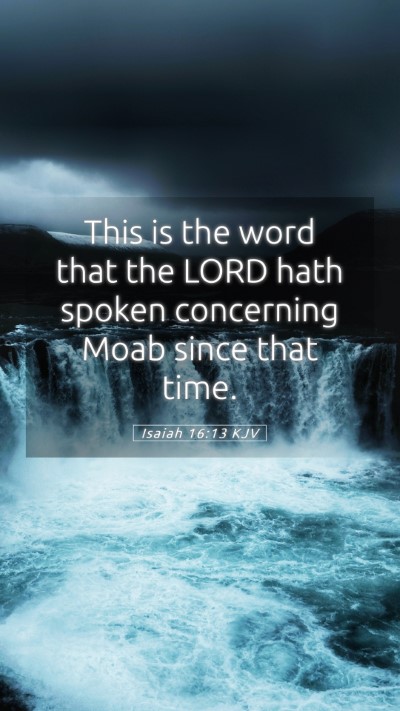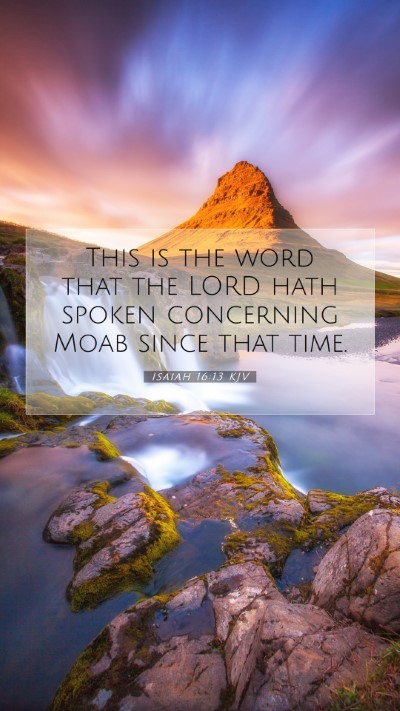Understanding Isaiah 16:13
Isaiah 16:13 states: "This is the word that the LORD has spoken concerning Moab since that time." This verse highlights the prophetic messages delivered concerning the nation of Moab, emphasizing God's role in communicating His will through His prophets.
Meaning of Isaiah 16:13
The verse serves as a reminder that God's words, specifically regarding nations and their fates, are divinely appointed and carry significant weight. Let’s explore the meanings derived from various public domain commentaries.
Bible Verse Commentary Insights
-
Matthew Henry's Commentary:
Matthew Henry interprets this verse within the broader context of God’s judgment on nations. He notes that the prophecy concerning Moab serves as an example of divine retribution and the necessary consequence of their actions against God’s people. This serves both as a warning and a fulfillment of longstanding prophecies regarding Moab’s fate.
-
Albert Barnes' Notes:
Barnes focuses on the specificity of God's messages. He emphasizes that the prophecy is not just a general statement but is meant to be taken seriously by the people of Moab. His understanding reflects the nature of prophetic literature as a model for divine communication, which holds relevance in understanding Scripture today.
-
Adam Clarke's Commentary:
Adam Clarke highlights the historical context of Moab's situation and its implications in the life of Israel. Clarke provides insights into how the Moabites were perceived in Israelite society, illustrating the significance of God's political and spiritual declarations through prophets in the Old Testament.
In-Depth Analysis of Bible Verse
In examining this verse, it is essential to understand its historical relevance and the implications for modern readers. Here are some biblical study insights:
1. The Role of Prophecy
Administering prophetic messages, as expressed in Isaiah 16:13, signifies God's authority over nations and peoples. This invitation to reflect on divine communication invites readers to consider how these messages apply to both historical contexts and personal faith.
2. Divine Judgment and Mercy
The overarching theme of divine justice discussed throughout Isaiah serves as a reminder of God’s holiness and the eventual outcomes of nations that turn away from Him. Moab’s warnings and the resultant consequences can be compared and contrasted with God's merciful overtures, reminding believers of the duality of God’s nature.
3. Application for Today
For contemporary believers, the understandings derived from Isaiah 16:13 extend beyond historical analysis to practical applications in one’s faith journey. Understanding how God's prophetic messages should influence modern lives prompts readers to explore their spiritual and communal responsibilities.
Cross References
This verse is interrelated with several other biblical passages, providing additional contexts for understanding:
- Isaiah 15:1 - Describes the burden against Moab, highlighting the impending judgment.
- Jeremiah 48:27 - Further elaborates on the history and judgment of Moab.
- Romans 15:4 - Discusses the purpose of Scripture, providing encouragement through the historical accounts found within.
Conclusion
Isaiah 16:13 serves as a vital component in understanding both the historical judgments upon Moab and the broader messages of divine communication found in the Scriptures. By utilizing Bible study tools and resources like commentaries, modern readers can gain a deeper understanding of God's intentions both in ancient contexts and in the application of His word today.


